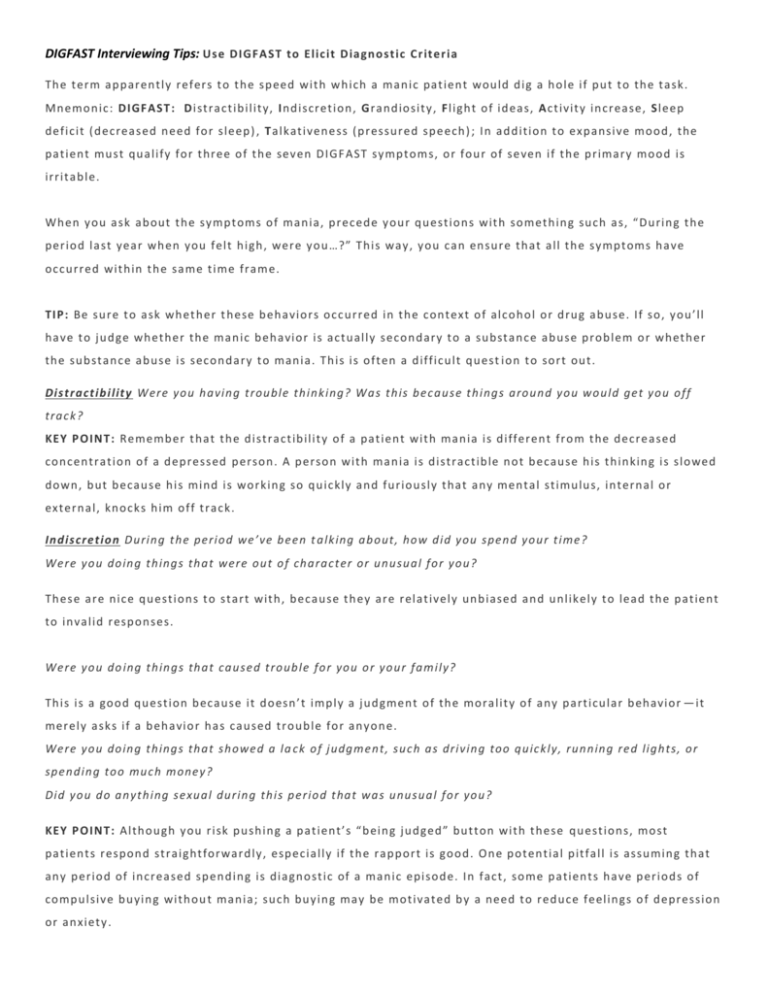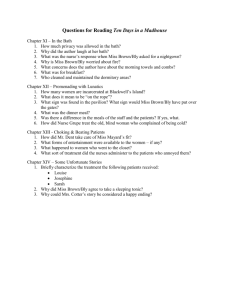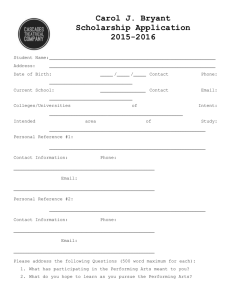DIGFAST Interviewing Tips: Use DIGFAST to Elicit Diagnostic Criteria
advertisement

DIGFAST Interviewing Tips: Use DIGFA ST to Elicit D iagn ostic Cr iter ia Th e term ap p aren tly refers to th e sp eed with w h ich a man ic patien t wou ld d ig a h ole if p u t to th e task. Mn emon ic: DIGF AST : Di stractib ility , Ind iscretion , Grand iosity, Fligh t of id eas, Activity in crease, Sleep d eficit (d ecreas ed n eed for sleep ) , Talkativen e ss (p ressu red sp e ech ) ; In ad d ition to exp an sive mood , th e p atien t mu st q u alify for th ree of th e sev en DIGF AST symp tom s, or fou r of se ven if th e p rimary mood is irritab le. Wh en you ask ab out th e sy mp toms of man ia, p reced e you r q u estion s with someth in g su ch as, “Du rin g th e p eriod last year wh en you felt h igh , were y ou …?” Th is way, you can en su re th at all th e symp toms h ave occu rred with in th e same time fram e. TIP: Be su re to ask wh et h er t h ese b eh aviors occ u rred in th e con text of alcoh ol or d ru g ab u se. If so, you ’ll h ave to ju d ge wh eth er th e man ic b eh avior is actu ally secon d ary to a su bstan ce ab u se p rob lem or wh eth er th e su b stan ce ab u se is secon d ary to man ia. Th is is often a d ifficu lt q u est ion to sort ou t. Distractibi lity Were yo u having trouble thinking? Was this bec ause things around you would get you off trac k? KEY P OINT: Rem emb er t h at th e d istractib ility of a p atien t with man ia is d ifferen t from th e d ecre ased con cen tration of a d ep ress ed p erson . A p erson with man ia is d istractib le n ot b ecau se h is th in kin g is slowed d own , b ut b ecau se h is min d is workin g so q u ickly an d fu riou sly that any men tal stimu lu s, in tern al or extern al, kn ocks h im off track. Indiscretion During the perio d we’ve been t alking about, how did you spend your time? Were you doing things that were o ut o f charac ter or unusual for you? Th es e are n ice q u estion s to start with , b ecau se th ey are relatively u n b iased an d u n likely to lead th e p atien t to in valid resp on ses. Were you do ing things that caused tro uble for you or your family? Th is is a good q u estion b ecau se it d oesn ’t imp ly a ju d gmen t of th e morality of any p articu lar b eh avior —it merely asks if a b eh avio r h as cau sed trou b le for an yon e. Were you doing things that sho wed a la ck o f judgment, suc h as driving too quic kly, running red lights, or spending too muc h m o ney? Did you do anything sexual during this perio d that was unusual for you? KEY P OINT: Alth ou gh y ou risk p u sh in g a p atien t’s “b ein g ju d ged ” bu tton with th ese q u estion s, m ost p atien ts resp on d straightforward ly , esp ecially if th e rap p ort is good . On e p oten tial p itfall is assu min g th at an y p eriod of in creased sp en d in g is d iagn ostic of a man ic ep isod e. In fact, some p atien ts h ave p eriod s of comp u lsive b u yin g with ou t man ia; su ch bu y in g may b e motivated b y a need to red u ce feelin gs o f d ep ression or an xiety . Grandiosity During this perio d, did yo u feel espec ially self -c onfident, as if you c ould conquer the world? Did you have particularly go o d ideas? Did you feel that you were right and that everybody else was wrong? Often , th is is a good opp ortu n ity to elicit th e gran d iose d elu sion s th at are so common in man ia: Did you feel like yo u had any spec ial po wers? Did you feel more religious than no rm al? Flight of Ideas Did yo u have so m any ideas that you c ould barely keep up with them? Were thoughts rac ing thro ugh yo ur head? Were other people having a hard tim e understanding your ideas? Wh en asses sin g fligh t of id eas, b e aware th at “racin g th ou ghts” p er se are n ot sp ecific to b ip olar d isord er. Patien ts with an xiety d isord ers, ADHD, or d ep ression with an xiou s ru mination s common ly d escrib e th eir th ou gh ts as “racin g.” A good way to d istin gu ish man ic racin g from an xiou s racin g is to ask: Were your thoughts rac ing in a go od way o r i n an unpleasant, worried, or depressed way? Patien ts exp erien cin g m an ic ep isod es often h ave a sen se of an “acceler ated ” th ou gh t p rocess t h at is like a joy rid e in a stolen car. Patien ts with an xiety or d ep ression will f eel v ery d ifferen tly. Activity Incre ase Th e ac tivity in crease criterion is similar to in d iscretion , b u t focu ses sp ec ifically on th e fren etic n atu re of th e activity . Were yo u mo re active than usual? Were you constantly starting new pro jec ts o r hobbies? Did you have so muc h energy that yo u felt it was hard to c alm down? S leep Deficit Did yo u need less sleep than usual? Did you ever stay up all night do ing all kinds of things, suc h as working on projects or c alling people? TIP: Be carefu l n ot to con fu se th e sleep l es sn es s of d ep ression or an x iety with man ia. Patien ts with man ia stay awake b ecau se th ey h ave so mu ch to th in k ab ou t an d d o (and th e en ergy to d o it) , wh ereas d ep ressed p atien ts stay awake b ecau se th ey feel tortu red b y th eir feelin gs. Th eref ore, b e su re to ask p atien ts wh at sorts of th in gs th ey d o wh en th ey can ’ t sleep . Patien ts with man ia may rep ort ‘p rod u ctive ’ activities. Talkativeness Did yo u find it hard to stop talking? Did o ther people tell you that they had tro uble understanding you? Did friends have to interrupt yo u to get a word in edgewise? Were you using the phone m o re than usual? Other Tips for Diagnosi ng M ania : 1. Histo r y of h osp italization : If a p atien t was h osp italized d u rin g a “h y p er” p eriod , ch an ces are good that th is was in d eed a man ic ep isod e. 2. In ter view with r elatives an d fr ien d s: On e of th e h allmarks of man ia is a lack of in sigh t, makin g verifi cation of h istorical in formation p articu larly imp ortan t. 3. Fam ily h isto r y o f b ip olar d isor der : Bipolar d isord er is on e of th e mos t in h eritab le of all p sych iatric d isor der.




